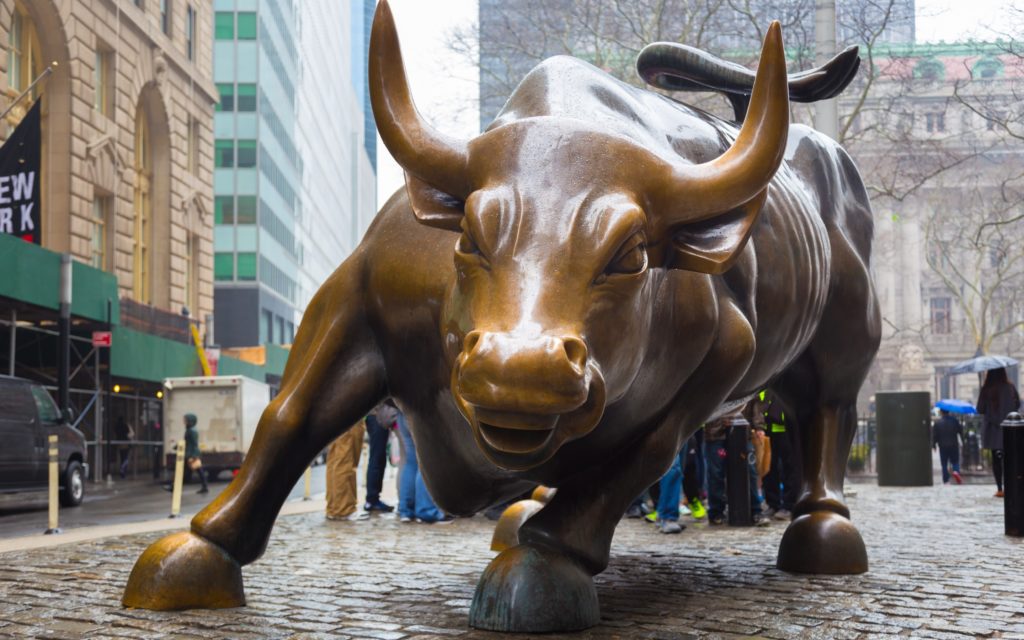
Investors have plenty of reasons to be cheerful as we head into the first few weeks of the new year. The global economy is strong and expected to continue growing in 2018. The US tax cuts approved just before Christmas could push up the profits – and in turn, the share price – of many US companies.
There are, however, a few headwinds. Not everyone will benefit from the tax cuts in the US. Uncertainties around Brexit and oil prices still weigh on investors’ minds. Stock market valuations are at their highest level since 1900, according to investment giant Goldman Sachs.
A valuation is a measure of the value or worth of a company. When valuations are high, it is expensive to buy shares and pricey shares can be risky. “When you buy something very expensive, you are very exposed if anything goes wrong,” said David Flynn, chief investment strategist with Baggot Investment Partners.
The current bull market is one of the longest on record. Goldman Sachs recently warned that there would “eventually” be a bear market (where stock markets start to fall and drop at least 20pc from their peak). “We think the bull market will continue into 2018,” said Andrew Milligan, head of global strategy at Aberdeen Standard Investments (ASI). “We see a few headwinds in 2018 but we don’t see the conditions falling into place for a bear market. We don’t think equity markets will give as strong returns as they did in 2017 though.”
Davy agrees. “We think markets can move higher [this year],” said Brian O’Reilly, head of global investment strategy at Davy Private Clients. “Return expectations are lower for 2018 than 2017 though -because of the high valuations across equities and bonds.”
So with this mixed bag of finances, which investments could make money this year?
European shares
European bank shares could do well this year, as might the shares of cyclical companies exposed to the economic momentum in Europe – if the European economy continues to recover, according to O’Reilly. (Cyclical companies are firms which typically do well in economic upturns.)
“We are seeing stabilisation and improvement in Europe’s economy,” said O’Reilly. “We are seeing more signs of life in the economies of Germany, France and Italy. That’s really positive. The European banking sector has lagged considerably over the last few years. With the recovery, the [European] banks are likely to lend more – and so their profits should go up. Shares in the Eurostoxx 300 index are specifically tipped by O’Reilly. “European valuations are not cheap – but they’re cheaper than the US,” said O’Reilly.
US shares
Many US shares are expensive due to high stock market valuations. It could still be possible to make money on US shares this year however. The US stock market may be lifted by the tax cuts being pushed through by its president, Donald Trump, this year. “Tax cuts will be positive for US markets and world markets – the US consumer is the main driver of global growth,” said O’Reilly.
However, some firms will not benefit as much as others. Tech companies, for example, may lose out as many are already paying tax at relatively low rates. “The more domestically-focused companies in the US will be the main beneficiaries of any growth in US markets,” said O’Reilly.
Trump also wants to reduce banking sector regulation, which could give US bank shares a lift.
Although politics can have an impact on stock markets, it is company profits which investors should ultimately be concerned about, according to Milligan. “A lot of people get concerned about politics – whether that’s Brexit or Trump – but at the end of the day, the world economy is picking up and a lot of companies are making decent profits,” said Milligan. “So investors should follow the profits – and find a fund manager that’s able to invest in companies that are delivering profits.”
ASI believes that although equity markets are expensive, better corporate profits can drive positive returns on stock markets this year.
Building optimism
Trump is expected to push through an infrastructure bill this year – following the vows he made during his election campaign to “transform America’s crumbling infrastructure”. Should that bill be passed, the shares of big material, industrial and equipment firms which will have exposure to, or involvement in, US infrastructure projects, could do well.
Recent calls for more investment in European infrastructure could also see more spending on the construction of roads, toll roads, bridges, ports and airports across Europe in the coming years. “We are seeing governments starting to increase their infrastructure spending,” said O’Reilly “So infrastructure funds could do well this year – as could the shares of CRH – and any companies exposed to big government contracts to build roads, schools and transport.”
Gold
One of the biggest investment opportunities this year is in gold and gold mining stocks, according to Flynn. “I expect gold and gold mining companies to experience a staggering bull market over the next few years,” said Flynn
Shares in gold mining companies are trading at “historically cheap levels”, according to Flynn. “We have recently seen the heaviest insider buying in gold than we have seen since late 2015 and early 2016 – when gold prices bottomed.”
Flynn expects there to a rush of investors into gold eventually – which would in turn push gold prices up. “The catalyst [for that rush] is likely to be stock market turmoil of some kind – probably driven by debt, which creates a lot of volatility and causes a wave of selling in big cap equities, corporate bonds, and potentially other types of bonds as well.” Some of the gold stocks recommended by Flynn include New Gold, Yamana Gold, Goldcorp and Centerra Gold
Offices and shops
Irish commercial property is a bit of a wildcard. Davy expects it to continue to do well this year – in particular Irish and European commercial property which pay income yields in excess of 4.5pc. However, ASI is more guarded about Irish commercial property. “Irish property has been on a remarkable run in recent years and the prognosis from here is that performance will be healthy in the medium-term – although the impact of Brexit is hard to determine and has added a level of uncertainty for investors,” said Craig Wright, real estate and strategy analyst with ASI. The tripling of stamp duty on Irish commercial property in the Budget could go against investors, according to ASI. “Recently introduced upward and downward rental reviews means the latter can be imposed for the first time – with the potential to damage future rental flows,” said ASI in a recent note. “Supply is expected to increase fairly significantly in the next couple of years.”
ASI believes parts of Europe – like offices in the central business districts of Amsterdam and Madrid – could do well. But high street shopping centre investors could be vulnerable. “Online shopping is causing difficulties for high street shopping malls,” said Milligan.
We’ve learnt a lot of hard lessons about property in recent years. Tread carefully.
























